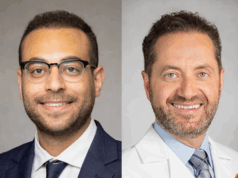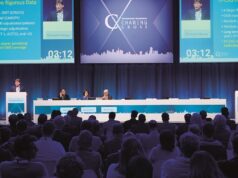
Silk Road Medical data presented at the VEITH Symposium have found comparable results for transcarotid artery revascularisation (TCAR) and carotid endarterectomy (CEA), among other positive conclusions.
The 44th annual VEITH Symposium (November 15-19, 2016; New York City, USA) featured several presentations on Silk Road Medical’s Transcarotid neuroprotection and stent system, the only products indicated for TCAR. Highlights include one-year data on the pivotal cohort from ROADSTER 1 and the first interim analysis of the 30-day data from the ROADSTER 2 post-approval study.
Mahmoud Malas, director of Endovascular Surgery, Johns Hopkins Bayview Medical Center, Baltimore, USA, and national co-principal investigator for the ROADSTER 1 long-term follow-up study, presented midterm results of the study. The objective of the ROADSTER 1 study is to evaluate the incidence of ipsilateral stroke through one year for patients treated during the pivotal and continued access phases of the ROADSTER 1 trial. In this ongoing retrospective review of the 141 patients treated in the pivotal phase, Malas reported outcomes for 87 patients with long term follow-up (median 1.3 years; range 0.5-2.9 years). In this cohort, one patient presented with an ipsilateral stroke following the periprocedural period for an overall one year ipsilateral stroke rate of 1.1%. Data collection in this cohort continues and will be published upon completion. Malas concluded that long term outcomes with TCAR are comparable to CEA in the standard surgical risk population.
Vikram Kashyap, of University Hospitals Case Medical Center, Cleveland, USA, and national co-principal investigator of the ROADSTER 2 study, presented “Early Results of The ROADSTER 2 Post-Market Registry of TCAR in High Risk Patients with Carotid Stenosis.” The ROADSTER 2 post-market study is evaluating the real world use of the ENROUTE neuroprotection and stent systems in a boarder group of operators with little or no TCAR experience. In this interim analysis of high surgical risk patients treated according to the US Food and Drug Administration (FDA)-approved protocol (n=195), Kashyap reported that the procedural success rate in ROADSTER 2 defined as acute device and technical success in the absence of stroke, death or myocardial infarction at 30 days is 97.5%. Kashyap further noted that the stroke and death rate in those patients with 30-day follow-up (n=159) is 1.3% and 1% for all patients enrolled thus far. With more than 50% of the enrolment coming from new TCAR operators, the outcomes are on par with ROADSTER 1 which reported the lowest stroke rate in any prospective study of carotid revascularisation.
Christopher Kwolek, director of the Vascular and Endovascular training program at Massachusetts General Hospital, Boston, USA, chief of Vascular Surgery at Newton Wellesley Hospital, Newton, USA, and national co-principal investigator for the ROADSTER 1 trial, presented “New Developments In The Silk Road System For TCAR: Details And Improvements In the ENROUTE System For CAS: How It Works And Achieves Flow Reversal Embolic Protection: Indications, Contraindications And Learning Curve Issues.” Kwolek highlighted the technical improvements in the next generation ENROUTE neuroprotection system released earlier in 2016 as well as the procedural advantages of the first and only FDA-approved carotid artery stent system indicated for TCAR. Kwolek noted that new TCAR operators can achieve CEA-like outcomes with a short learning curve.













